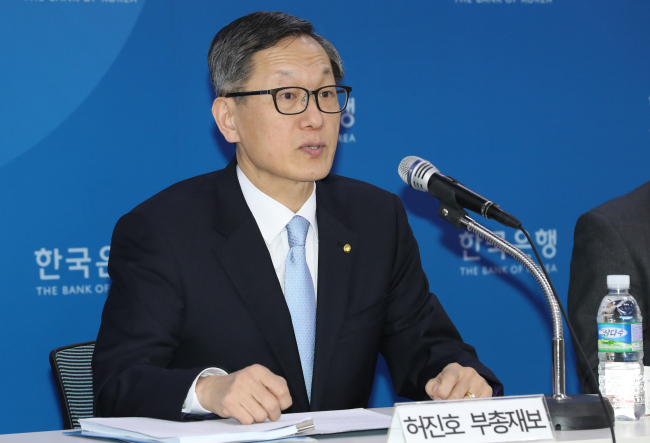BOK warns of slow pace in private consumption, despite steady growth
By Bae Hyun-jungPublished : Feb. 8, 2018 - 16:53
South Korea’s economy has entered a recovery track, steered by global economic improvement and strong exports, but its private consumption sector remains slow due to a record-high amount of household debt, the nation’s central bank said Thursday.
According to the Bank of Korea‘s monetary policy report to the National Assembly, private consumption climbed by 2.3 percent from the fourth quarter of 2016 to the third quarter of last year, marking slow growth compared to the conventional yearly figure of 6.2 percent.
“The household debt total is still very high and the ratio of household debt to disposable income is continuing to increase,” said BOK’s Deputy Gov. Huh jin-ho in a press briefing.
“Consumption appears to be on slow growth as household consumers cannot afford to spend.”
According to the Bank of Korea‘s monetary policy report to the National Assembly, private consumption climbed by 2.3 percent from the fourth quarter of 2016 to the third quarter of last year, marking slow growth compared to the conventional yearly figure of 6.2 percent.
“The household debt total is still very high and the ratio of household debt to disposable income is continuing to increase,” said BOK’s Deputy Gov. Huh jin-ho in a press briefing.
“Consumption appears to be on slow growth as household consumers cannot afford to spend.”

Household debt in the nation hit a record high of 1.4 quadrillion won ($1.3 trillion) as of the end of September last year, while the actual income increase rate turned negative from a year earlier.
Policymakers and leading global credit ratings agencies remain optimistic about the nation’s economic forecast, but the snowballing amount of household debt has been pointed out as a risk factor, suppressing private consumption.
“Under an increasing loan interest rate, the economically vulnerable cluster may start to find it difficult to repay their debts, which will expand the household debt total and hold back the actual economic growth,” the BOK official said.
In addition to the household debt issue, the central bank also expressed concerns about the conspicuous uptrend in real estate loans and individual business loans, adding that they may act as risk factors amid a rebounding base interest rate.
“The proportion of loans for specific business sectors has recently increased,” the BOK report said, citing real estate-related loans and owner-operator loans from nonbank financial institutions.
“An imbalance in the loan portfolio may damage the soundness of financial organizations in case of an interest rate hike or real estate market downturn.”
As for the nation’s policy rate, which was raised from a record-low 1.25 percent to 1.5 percent in November, the BOK maintained the conventional stance that further hikes are plausible under current circumstances.
“We will carefully look into the possibility of further (rate hike), keeping watch on changes in domestic and overseas markets, as well as the consequent economic growth and market prices,” the bank said.
The BOK added that it would not just raise the base interest rate just to keep in step with the US’ gestures at hikes.
“A change in the US monetary policies is a key factor to consider, but won’t be the only reason to trigger the BOK’s own monetary moves,” Huh said.
By Bae Hyun-jung (tellme@heraldcorp.com)






![[From the Scene] Monks, Buddhists hail return of remains of Buddhas](http://res.heraldm.com/phpwas/restmb_idxmake.php?idx=644&simg=/content/image/2024/04/19/20240419050617_0.jpg&u=20240419175937)





![[Graphic News] French bulldog most popular breed in US, Maltese most popular in Korea](http://res.heraldm.com/phpwas/restmb_idxmake.php?idx=644&simg=/content/image/2024/04/18/20240418050864_0.gif&u=)


![[From the Scene] Monks, Buddhists hail return of remains of Buddhas](http://res.heraldm.com/phpwas/restmb_idxmake.php?idx=652&simg=/content/image/2024/04/19/20240419050617_0.jpg&u=20240419175937)

![[KH Explains] Hyundai's full hybrid edge to pay off amid slow transition to pure EVs](http://res.heraldm.com/phpwas/restmb_idxmake.php?idx=652&simg=/content/image/2024/04/18/20240418050645_0.jpg&u=20240419100350)

![[Today’s K-pop] Illit drops debut single remix](http://res.heraldm.com/phpwas/restmb_idxmake.php?idx=642&simg=/content/image/2024/04/19/20240419050612_0.jpg&u=)